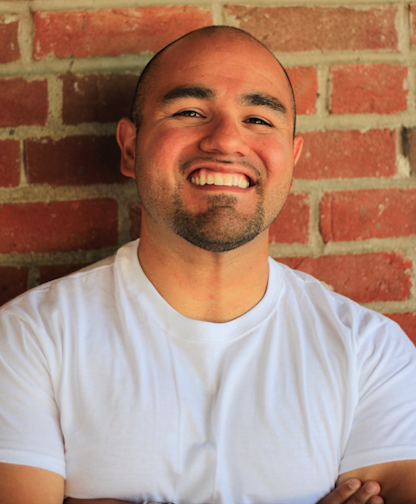Paul Yoon: 'Person of Korea,' a Short Story - The Atlantic
Paul Yoon: 'Person of Korea,' a Short Story - The Atlantic |
- Paul Yoon: 'Person of Korea,' a Short Story - The Atlantic
- Arts & Letters: Michael Torres at UCRiverside Palm Desert - Palm Springs Life
- Graduate Course Shifts Focus on Black Women Writers, Away From the 'Single Story' - DrexelNow - Drexel Now
| Paul Yoon: 'Person of Korea,' a Short Story - The Atlantic Posted: 13 Mar 2021 06:02 AM PST [unable to retrieve full-text content]Paul Yoon: 'Person of Korea,' a Short Story The Atlantic |
| Arts & Letters: Michael Torres at UCRiverside Palm Desert - Palm Springs Life Posted: 15 Mar 2021 11:53 AM PDT Arts & Letters: Michael Torres Author of An Incomplete List of Names 6 p.m. Friday, March 19 Our next Arts & Letters event is an evening with acclaimed poet Michael Torres, author of An Incomplete List of Names, an astonishing debut collection that looks back on a community of Mexican-American boys grappling with assimilation versus the impulse to create a world of their own. Torres will be in conversation with Tod Goldberg, New York Times bestselling author and director of the low-residency MFA creative writing program at UCR Palm Desert. This event will be live via Zoom. A Q&A will follow the conversation. About An Incomplete List of Names: Who do we belong to? That is the question Michael Torres ponders as he explores the roles that names, language, and others' perceptions play on our understanding of ourselves. More than a boyhood ballad or a coming-of-age story, this collection of poetry illuminates the artist's struggle to make sense of the disparate identities others have forced upon him. His description of his childhood is both idyllic and nightmarish, sometimes veering between the two extremes, sometimes a surreal combination of both at once. He calls himself "the Pachuco's grandson" or REMEK or Michael, depending on the context, and others follow his lead. He worries about losing his identification card, lest someone mistake his brown skin for evidence of a crime he never committed. He wonders what his students—imprisoned men who remind him of his high school friends and his own brother—make of him. He wonders how often his neighbors think about where he came from, if they ever do imagine where he came from. Register now! https://ucr.zoom.us/webinar/register/WN_5nBbWGtCTeCWa9GExwGGpg  Michael Torres Michael Torres was born and brought up in Pomona, California where he spent his adolescence as a graffiti artist. His debut collection of poems, An Incomplete List of Names (Beacon Press, 2020) was selected by Raquel Salas Rivera for the National Poetry Series and named one of NPR's Best Books of 2020. His honors include awards and support from the National Endowment for the Arts, the McKnight Foundation, the Bread Loaf Writers' Conference, CantoMundo, VONA Voices, the Minnesota State Arts Board, the Jerome Foundation, the Camargo Foundation, and the Loft Literary Center. Currently he's an Assistant Professor in the MFA program at Minnesota State University, Mankato, and a teaching artist with the Minnesota Prison Writing Workshop. Visit him at: michaeltorreswriter.com  Tod Goldberg Tod Goldberg is the New York Times bestselling author of several books of fiction, including the novels Gangster Nation, The House of Secrets, which he co-authored with Brad Meltzer, Gangsterland, a finalist for the Hammett Prize, Living Dead Girl, a finalist for the Los Angeles Times Book Prize, Fake Liar Cheat, and the popular Burn Notice series, as well as two collections of short stories, Simplify and Other Resort Cities. His essays, nonfiction, and journalism have appeared widely, including Best American Essays 2013. He directs the Low Residency MFA in Creative Writing & Writing for the Performing Arts at UC Riverside. |
| Posted: 26 Feb 2021 12:00 AM PST Trapeta Mayson (left) and Yolanda Wisher, adjunct instructors in the Department of English and Philosophy in the College of Arts and Sciences at Drexel University, are teaching "Black Women Writing: Short Stories (CW T680)" to graduate students. (Pre-pandemic photo) Disclaimer: Beth Ann Downey is currently a student in "Black Women Writing: Short Stories (CW T680)," the class that is the subject of this story, as a second-year MFA student.
Trapeta Mayson and Yolanda Wisher, adjunct instructors in the Department of English and Philosophy in the College of Arts and Sciences at Drexel University, had their students watch author Chimamanda Ngozi Adichie in a TED Talk video during the second week of their "Black Women Writing: Short Stories" class this winter term. In her talk, titled "The Danger of a Single Story," the prolific Nigerian writer describes how stereotypes manifest both in society and in literature. "The problem with stereotypes is not that they are untrue, but that they are incomplete," she said in the 2009 address. "They make one story become the only story." It is this same kind of myopia that the class aims to address — and why it was folded into the curriculum of Drexel's Master of Fine Arts in Creative Writing program in an effort to diversify faculty representation, then further affirmed by Drexel's renewed anti-racism efforts — by presenting and thoughtfully exploring the works of 19th century through 21st century Black women writers so often neglected within the American literary canon. "I think Yolanda and I talk a lot about just the erasure, or the fact that these writers often are not put on the platform that they need to be put on and are not as widely known as they need to be," Mayson said. "Because we are imprisoned by a white literary canon, how many stories are not being told and how much of the American story is not being seen?" added Wisher, who experienced this firsthand as a high school English teacher for 10 years when she wanted to champion these writers in her classroom. "There's so much that we get through these Black women writers' stories about our country and the history of this country and what it means to be an American. The literature of Black women writers gives you a very different perspective and in a very different voice. It speaks to a wider group of people and a wider readership." (From left to right, top row) Frances Ellen Watkins Harper, Alice Dunbar Nelson, Zora Neale Hurston, (bottom row) Toni Cade Bambara, Chimamanda Ngozi Adichie, Mecca Jamilah Sullivan. In addition to Adichie's nonfiction and short stories, the class of 16 graduate students also studied work by Alice Walker, Frances Ellen Watkins Harper, Alice Dunbar-Nelson, Zora Neale Hurston, Toni Cade Bambara and Mecca Jamilah Sullivan. Mayson and Wisher chose to focus on these writers due to a number of factors, including their many accomplishments, their pioneering and diverse styles, and the instructors' joint admiration that they hoped would translate into excitement and engagement for students. "In each of these women's hands, the short story form takes on different proportions and has different powers and potentials," Wisher said. "When I look at all of these women, they're kind of renegades in a way. They're outlaws of the form but also of literature." Nomi Eve, an assistant teaching professor for the College of Arts and Sciences and director of the MFA program, recognized the importance of centralizing these writers and their work in the curriculum she had set forth for the MFA, as well as making it available to other graduate students. Eve tapped into Mayson and Wisher's authority in teaching the material established through an iteration of the class they hosted through The Rosenbach museum in the summer and fall of 2020. Mayson and Wisher are both on The Rosenbach's board of directors. "I believe that we must centralize Black voices in all of our courses," Eve said. "Students need to read this work and consider these perspectives and learn this part of literary history if they are to graduate and make literature that is relevant and write stories that will move the needle on the greatest of issues facing us today — that of social justice." Moving this needle also means facing head-on the difficult topics addresses by the Black women writers in the class — those of racism, sexism and classism that are still relevant today. Wisher and Mayson agree that their co-teaching style and shared ownership of the texts helps promote a safe space for these poignant conversations. "It stems from our desire to have real talk, to create a curriculum that invites discussion about the things that make us really deeply or tragically or violently human," Wisher said. "We need spaces to talk about this. And I think the arts and literature provide a layer of creativity and empathy that allow us to have those kinds of conversations in safe, supportive, reflective, but also direct and frank ways. We just want to be real, and the work allows us to do that." Jeannine Cook, a second-year MFA student as well as community activist and owner of Harriett's Bookshop, first witnessed the instructors' "masterful co-teaching" as part of the initial Rosenbach course, and now again as part of her graduate coursework. Everything she is learning, Cook said, makes her a better writer, a better businesswoman and a better Philadelphian. "I think what Drexel and all institutions get to understand is that a healthy future depends on our ability to amplify the voices that have been stifled — the voices that are going to lead us and guide us," Cook said. Cook's proof point came once again in week two, when students were asked to respond to the Adichie video with their own TED Talk outlining when they first realized this trope of the "single story." Several students credited a high school or college class with providing this important perspective or mental shift — one that opened their eyes to such inclusive or familiar work like that which "Black Women Writing" teaches. Students meet synchronously for "Black Women Writing: Short Stories (CW T680)" class this term. The class promotes anti-racism by disrupting the white literary cannon and shining a light on 19th century through 21st century Black women renegades. "I think of universities and colleges as places where you go to learn how you think; to learn how you think differently from other people, and more importantly, knowing all of that, how to get along and do things collectively and achieve mutual good," Wisher said. "That's what I think you you're supposed to learn at college. Colleges, schools, and educational centers are the front line of this work." "[These courses should be taught] just like anything else is. … It expands that worldview, that global perspective, that ability to thrive," Mayson said. Eve plans to offer the same course or similar opportunities within the MFA curriculum moving forward. Similarly, Mayson and Wisher will continue to discuss ways to create spaces for Black women and other women of color to gather around this work without the presence of white readers. But no matter who is studying or reading along, each educator is dedicated to this divergence from the single story. "What's most exciting about this course is the times when we do get together and just talk about characters," Wisher said. "People that we've never met — and who don't exist — but who give us a way to talk about the hard stuff." |
| You are subscribed to email updates from "famous short story,short stories for high school" - Google News.
| Email delivery powered by Google |
| Google, 1600 Amphitheatre Parkway, Mountain View, CA 94043, United States | |






Comments
Post a Comment